|
|
|
Sort Order |
|
|
|
Items / Page
|
|
|
|
|
|
|
| Srl | Item |
| 1 |
ID:
120749
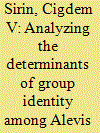

|
|
|
|
|
| Publication |
2013.
|
| Summary/Abstract |
This study systematically explores the factors that affect collective identity associations within the Alevi community in Turkey by employing the social identity approach and examining survey data collected through fieldwork. The results show that Kurdish Alevis express lower levels of attachment to their religious identity as compared to Turkish Alevis. The results also indicate that personal experiences of discrimination tend to increase one's prioritization of Alevi identity. Last, no significant differences are observed regarding group identity between Alevis who reside in urban areas and those who live in rural areas.
|
|
|
|
|
|
|
|
|
|
|
|
|
|
|
|
| 2 |
ID:
139285
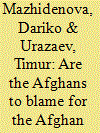

|
|
|
|
|
| Summary/Abstract |
Afghanistan has been and will probably remain not so much an equal partner for the nations around it, as a kind of buffer or ideological (and sometimes military) front where battles are waged, cease-fires are entered, and political “exchanges” are carried out. This country, which is called the heart of Asia in diplomatic terms, is merely a venue for major political bargaining, but not a real participant in it. Today’s attitude toward the problems of various regional and global nations makes resolution of the Afghan question difficult and requires a multi-stage approach; in order to tackle this task, the countries of the international community are setting up various dialog venues and mechanisms.
At that, Afghanistan represents a melting pot of Central Asian, East Iranian, Persian, and Turkic traditions that go back to Muslim Shi’ism, Hinduism, Buddhism, and Taoism. It is this intricate conglomerate that has determined the difficult lives of the people who call themselves Afghans and are trying to find their own niche in the Eurasian continent.
|
|
|
|
|
|
|
|
|
|
|
|
|
|
|
|
| 3 |
ID:
139254
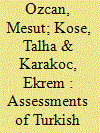

|
|
|
|
|
| Summary/Abstract |
Using original public-opinion polls and elite interviews conducted in 2012, this article analyzes the perceptions of Turkish foreign policy regarding the Arab Uprisings and the Syrian conflict in three Middle Eastern countries, Egypt, Iraq and Iran. It finds that ethnic, sectarian and religious groups in these three countries vary significantly in their views on Turkish foreign policy regarding both the Arab Uprisings and the Syrian conflict, although the same identity-related factors have a less salient effect at the elite level. The findings also suggest that the intersection of ethnicity and sect shapes people's attitudes toward Turkish foreign policy in Iran and Iraq. Sunnis, except for Kurds in Iran and Iraq, tend to have a positive view of Turkish foreign policy, while Shia Turkomans in Iraq tend to have a negative one.
|
|
|
|
|
|
|
|
|
|
|
|
|
|
|
|
| 4 |
ID:
131130
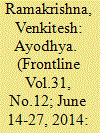

|
|
|
|
|
| Publication |
2014.
|
| Summary/Abstract |
In the new political climate, there is a pronounced assertiveness among Sangh Parivar outfits on core Hindutva programmes, including the construction of a Ram Temple in Ayodhya.
|
|
|
|
|
|
|
|
|
|
|
|
|
|
|
|
| 5 |
ID:
133528
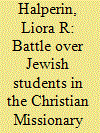

|
|
|
|
|
| Publication |
2014.
|
| Summary/Abstract |
Studies of Jewish students in Palestine's Christian missionary schools largely end at the close of the Ottoman period. But although a tiny and diminishing fraction of Jewish students studied in such schools after the First World War, the mandate period was marked by anxious and often zealous Zionist anti-missionary campaigns. The article considers this space of Jewish-Christian interaction, arguing that even as a Hebrew-dominant society took root, missionary schools provided education in European languages, particularly English, tools that offered advantages to Jewish students with an interest in clerical work or foreign study. The continuing appeal and importance of foreign language skills cast doubt on the Zionist pretence of a self-sufficient Hebrew society.
|
|
|
|
|
|
|
|
|
|
|
|
|
|
|
|
| 6 |
ID:
137182
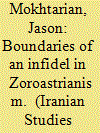

|
|
|
|
|
| Summary/Abstract |
This paper explores the Middle Persian term agdēn, which is often problematically translated as “infidel.” By tracing this term of otherness through Middle Persian texts such as legal cases in The Book of a Thousand Judgments and polemics in the Dēnkard Book III, this article argues that the concept of the infidel frequently appears in discussions about slavery, intermarriage, and conversion to and from Zoroastrianism. Middle Persian legal and theological texts regarding infidels deal with cases in which Zoroastrian interactions with non-Zoroastrians impinge upon Zoroastrian boundaries of identity. Moreover, the term agdēn often refers to Jews, Christians, and Muslims, thereby offering insight into the ties between Zoroastrian self-identity and other groups which the Persian priests encountered. In the end, this paper demonstrates the need for further intensive studies into Middle Persian technical terms of otherness as they lie at the heart of questions of Zoroastrian self-definition and attitudes towards others.
|
|
|
|
|
|
|
|
|
|
|
|
|
|
|
|
| 7 |
ID:
118601
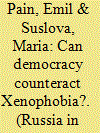

|
|
|
|
|
| Publication |
2012.
|
| Summary/Abstract |
Russians frequently engage in heated discussions about whether xenophobia is at the root of many large-scale conflicts. Some analysts - whom we shall call sporadic supporters of constructivism - hurl accusations at the mass media: there would be no phobias as a source of conflict if the media refrained from emphasizing the ethnic, racial, or religious identity of the conflicting sides or if they ignored such problems altogether. Supporters, also mostly sporadic, of the neo-institutional theory, which is more in fashion at present, object to such opinions and claim that conflicts arise out of flaws in the institutional system. If Russia were genuinely democratic and ruled by law, the fundamental prerequisites for ethnic and/or religious phobias would disappear.
|
|
|
|
|
|
|
|
|
|
|
|
|
|
|
|
| 8 |
ID:
132964
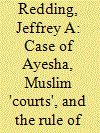

|
|
|
|
|
| Publication |
2014.
|
| Summary/Abstract |
This paper aims to challenge the disparagement of non-state Islamic systems of law that has established firm roots in contemporary rule of law ideology and practice around the world, from India to Ontario. In this respect, rule of law ideology has tended to ignore actual mechanics and procedures of law, not only in legal venues outside the state's direct control, but also in the state's courts themselves. With respect to non-state legal venues-and especially non-state Islamic legal venues-such ideology understands and describes the practices and procedures that it finds in these non-state venues as crude and underdeveloped at best, and illiberal and in violation of the rule of law at worst. While other scholarly work has vividly demonstrated the various transformations and mutations that any state's 'ideal legal procedure' experiences as it is put into real-world practice by a state's courts and judges, this paper makes a converse move. Using a case-study focused on the circumstances and experiences of an Indian Muslim woman, 'Ayesha', who recently used a Delhi dar ul qaza to exercise her Islamic divorce rights in India, this paper demonstrates how a non-state Islamic legal venue behaves in ways which are highly evocative of rule of law ideology's idealization of state courts and how they (should) operate procedurally. In doing so, this paper provides evidence for Partha Chatterjee's thesis as to how elite and subaltern domains-understood here to be embodied in both state and non-state legal venues, respectively-are products of 'mutually conditioned historicities'. In this case, the focus is on the state's conditioning of the non-state. As a result, rule of law ideology's state-oriented critique of the (Islamic) non-state is mistaken because, as this paper demonstrates, the non-state is produced in conversation with the state; one cannot critique the one (non-state) domain without realizing how that critique implicates the other (state) domain.
|
|
|
|
|
|
|
|
|
|
|
|
|
|
|
|
| 9 |
ID:
146344
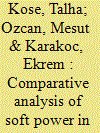

|
|
|
|
|
| Summary/Abstract |
This study explores the relationship between ethnic, sectarian, and religious identities and soft power in the Middle East and North Africa (MENA) region in the immediate aftermath of the Arab Uprisings. Utilizing original public opinion surveys conducted in Egypt and Iraq in 2012, we find that identity-based allegiances play a major role in groups’ choices regarding which countries’ increasing involvement in the region are seen favorably and which countries are seen as an ideal model for the region. Sunnis are likely to view Turkey and Saudi Arabia positively in both regards, whereas Shiites are more supportive of Iran. But our results also suggest that crosscutting cleavages should not be overlooked: Sunni Kurds are less likely to hold positive attitudes toward Turkey and Saudi Arabia. Our findings also show that Copts, a religious minority in Egypt, hold positive attitudes toward the United States and negative ones toward Saudi Arabia and Iran. These findings contribute to both the theoretical literature on soft power and the debates on international competition for influence in the MENA region by emphasizing the role of ethnic and religious identities in shaping attitudes toward international actors.
|
|
|
|
|
|
|
|
|
|
|
|
|
|
|
|
| 10 |
ID:
151292
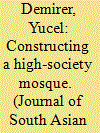

|
|
|
| 11 |
ID:
179849
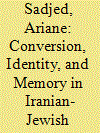

|
|
|
|
|
| Summary/Abstract |
The paper discusses the narratives of Jews from Mashhad, who were forced to convert to Islam in 1839. The community narrative as well as academic research is dominated by a modern understanding of religious identity and religious boundaries that fail to account for the diversity of practices among the community of converts, including multiple forms of religious belonging, and the switching of identities according to time and place. Based on historical sources and interviews with descendants from the Mashhadi community, the paper traces how a particular narrative of the history of the Jews from Mashhad prevailed and which significance this narrative entails for Mashhadi community and identity until today. While the Jews from Mashhad are a rather unique case among Iranian Jews–due to the long period in which they lived as converts–their pattern of memory building reflects a general trend among Jews from the Muslim world to assimilate to modern ideas of being Jewish.
|
|
|
|
|
|
|
|
|
|
|
|
|
|
|
|
| 12 |
ID:
132968
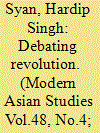

|
|
|
|
|
| Publication |
2014.
|
| Summary/Abstract |
This paper examines the public debate that happened among Delhi's Sikh community following the formation of the Khalsa by Guru Gobind Singh. The detail of this debate was expressed in the early eighteenth century Sikh text, Sri Gur Sobha. The Sri Gur Sobha explains how Delhi's Sikhs became divided into pro-Khalsa and anti-Khalsa factions, and how this conflict resulted in a campaign of persecution against Delhi's Khalsa Sikhs. In this paper I endeavour to analyse exactly why this dispute occurred and how it reflects wider political and socio-economic processes in early modern India and Sikh society. In addition, the paper will explore how the elite Khatri community consequently became an object of hatred in eighteenth century Khalsa Sikh literature.
|
|
|
|
|
|
|
|
|
|
|
|
|
|
|
|
| 13 |
ID:
137178
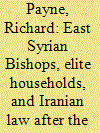

|
|
|
|
|
| Summary/Abstract |
This article is an exploration of the interconnected legal ties between Christians and Zoroastrians in the early Islamic era. Drawing from the writings of the Christian authors Ishobokt, Simeon, and Henanisho, Payne describes how East Syrian bishops appropriated laws of marriage, inheritance, and property from Iranian jurisprudential traditions as a means of transferring wealth intergenerationally and extending their judicial authority. Payne thus explores the ways in which the Christians of Iran were influenced by the Iranian legal system and culture and in the seventh century CE.
|
|
|
|
|
|
|
|
|
|
|
|
|
|
|
|
| 14 |
ID:
160700
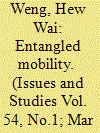

|
|
|
|
|
| Summary/Abstract |
In recent years, there is an increasing number of Hui migrants in Malaysia. This paper examines the accumulation of various forms of capital (cultural, social and economic) and the intersection of capitalization of “Chineseness” and “Muslimness” among overseas Hui. It begins with a discussion on the mobility capital — in which Hui Muslims enjoy relative freedom to move around in China and beyond China, compared to their Uyghur counterparts who have limited mobility. It is followed by analyzing how aspirations such as “cultural affinity,” “religious authenticity,” “educational mobility” and “business opportunity” drive contemporary Hui mobility to Malaysia. By describing the religious, cultural and business activities of Hui migrants, it explores how the accumulation and circulation of different forms of capital take place in mosques, in restaurants and on social media platforms. It proposes a concept of “entangled mobility” to examine the intersection between their cultural and religious identity, the interconnection between spatial and social mobility, the combination of religious and economic aspiration, as well as how their capital circulations are entangled with broader economic, social and political processes. However, instead of reifying cultural capital as given one, Hui migrants re-enact their cultural capital depending on the Malaysian contexts. Such enactment of cultural capital plays an important role in Hui mobility and enables them to navigate their life in multi-ethnic and multi-religious Malaysia.
|
|
|
|
|
|
|
|
|
|
|
|
|
|
|
|
| 15 |
ID:
170712
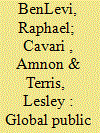

|
|
|
|
|
| Summary/Abstract |
How do publics around the world view Israel? With which side of the Palestinian-Israeli conflict are their sympathies and why? Using Pew survey data from 45 countries we analyse individual-level attitudes towards the two sides to the conflict, testing the influence of security factors, regime types and economic relations, as well as religious identity. We find a large range of attitudes, including high levels of sympathy for both Israel and the Palestinians as well as high levels of neutrality. Religious identity plays the most central role in determining whom to support, whereas economic and security factors are secondary.
|
|
|
|
|
|
|
|
|
|
|
|
|
|
|
|
| 16 |
ID:
133735
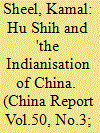

|
|
|
|
|
| Publication |
2014.
|
| Summary/Abstract |
Hu Shih was one of the most significant philosophers and intellectuals of China during the early twentieth century. As a professor of philosophy at Peking University, as a leader of the 'bai-hua' movement, and as an ideologue behind the famous May Fourth Movement of 1919, he was among the first contributors for radical ideological change and modernity in China. His article on the 'Indianization of China' presented a scathing criticism of Indian influence on China that inhibited the blooming of 'indigenous modernity', progressivism and dynamism there. Hu's views supported contemporary 'modernist' Chinese intellectuals' labelling of India under the British as a 'ruined' civilisation, 'failed' state or incapable role model for the agenda of modernity. Yet, he did not overlook affinities, mutual respect and admiration for those in India searching for 'indigenous roots' to modernity. His famous observation that 'India conquered and dominated China culturally for 20 centuries without ever having to send a single soldier across her border' is one of the most quoted sentences in any study of Sino-Indian encounters and connections. This article highlights multiple shades of Hu Shih's interpretation of India.
|
|
|
|
|
|
|
|
|
|
|
|
|
|
|
|
| 17 |
ID:
116590
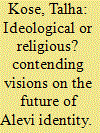

|
|
|
|
|
| Publication |
2012.
|
| Summary/Abstract |
Establishing a coherent collective identity within the modern urban context among people who have different ideological, social and religious orientations, and social and economic backgrounds, is an ongoing struggle within the Alevi community in Turkey. This study tries to understand how alternative positions on Alevi identity dynamically construct the boundaries, moral contents and the new shape of Alevi identity in modern urban contexts through use of various discursive resources. At least two main contending 'positions' on Alevi identity try to institutionalise Alevi identity in modern urban contexts, which are 'Ideological Position' and 'Religious Position'. Those discourse positions constitute different visions about the past and the future of the Alevi community as well as the cultural and the political boundaries of Alevi identity. More importantly, those positions resonate in ordinary citizens' life stories as well as group narratives. This study utilises the analytical frame of 'positioning theory' to shed light on the complexities of identity negotiation.
|
|
|
|
|
|
|
|
|
|
|
|
|
|
|
|
| 18 |
ID:
131137
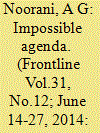

|
|
|
|
|
| Publication |
2014.
|
| Summary/Abstract |
The BJP's long running pledged for the abrogation of Article 370, for a Ram temple in Ayodhya, and for a uniform civil code are constitutionally impossible to fulfil politically divisive and morally outrageous.
|
|
|
|
|
|
|
|
|
|
|
|
|
|
|
|
| 19 |
ID:
139178
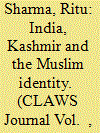

|
|
|
|
|
| Summary/Abstract |
Territory has always played a pivotal role in inter-state rivalry. John A Vasquez has said that the value of territories increases due to their strategic locations, such as if they provide access to the sea or are a source of water. But territories acquire another important dimension if they are home to ethnic and religious communities that form part of the neighbouring state.1 The state of Kashmir presents one such enduring conflict where the separatist demands in the state of Jammu and Kashmir (J&K), coupled with the irredentist claim of Pakistan, have helped in shaping a narrative in India. The popular assumption in India is that ‘Muslim separatism’ got manifested in the form of the country’s partition in 1947 and the prevalent contention is that Muslims had a choice of political identity but they chose one based on religion.2 This has resulted in an unintended linking of the Kashmiris’ demand for greater autonomy or a separate state with the identity of Muslims in the rest of India.
|
|
|
|
|
|
|
|
|
|
|
|
|
|
|
|
| 20 |
ID:
190091
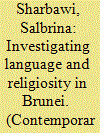

|
|
|
|
|
| Summary/Abstract |
The inexplicable link between the Malay language and Islam has been well-documented in Malaysia. In Brunei, however, this association has not been made explicit and could only be inferred through the state’s stance of utilising only the Malay language for Islamic-related matters, most conspicuously in the Islamic education curriculum. While this practice has been in place since the early days of Islamic education in the country, the changing linguistic situation in Brunei, where English is now more popular than Malay among the younger generation, may require some rethinking of this practice. An earlier study investigating the issues of language and religion in Brunei has found that those who are more English-inclined do not identify strongly with the Muslim identity as their Malay-leaning counterparts. Taking its cue from those findings, the present study extends the investigation in two ways: one, by adding the social variables age, gender and educational background in its analysis; and two, by focusing on the notion of religiosity rather than on religious identity alone. The findings show that age and language proclivity are both predictors of religiosity with older Bruneians displaying greater religiosity than the younger ones. Language also plays a factor such that those who are predisposed to using more English than Malay have fewer manifestations of practices aligned to the Islamic teaching. Gender and educational level, however, have low factor loadings and are not contributory to the measurement of religiosity.
|
|
|
|
|
|
|
|
|
|
|
|
|
|
|
|
|
|
|
|
|